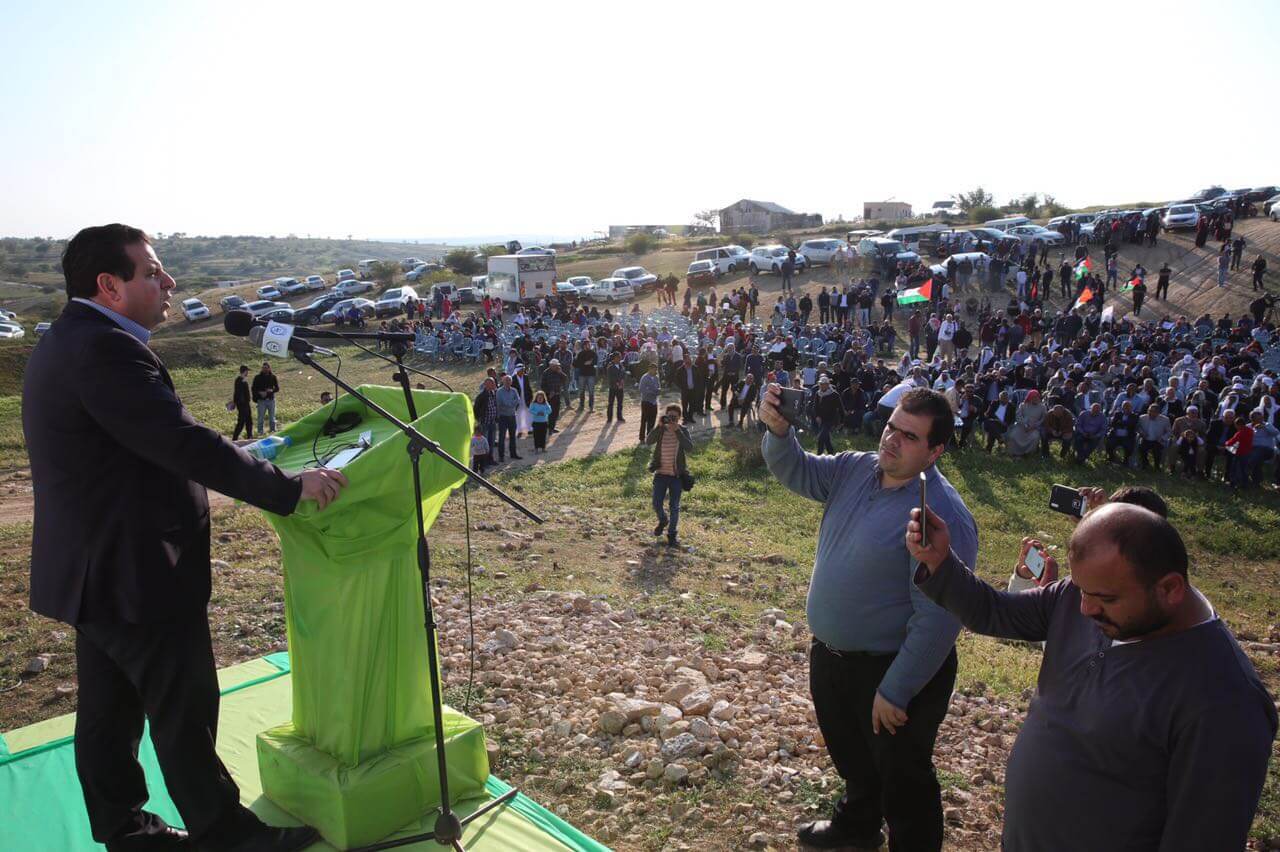Palestinian citizens of Israel today marked “Land Day,” an annual commemoration of protests that began 40 years ago on March 30, 1976 when Israeli police killed six during a demonstration over land confiscations. As in years past, a general strike was announced for one day, and thousands protested in the north and the south of the country in opposition to a similar looming round of land expropriations.
Members of Knesset Aida Touma-Sliman, a representative from the Joint List–Israel’s Arab faction and third largest political party–attended a march in the Galilee town of Arraba and site of the first Land Day protest in 1976.
“Actually it’s sad to be 40 years on, yet we are still fighting the same struggle and we are facing the same policies, and in fact it is even worse,” Touma-Sliman told Mondoweiss, “We thought that after 40 years that we would only be honoring the memory of land confiscation, but we are still facing a wider struggle.”
In Israel, “50,000 houses Arab houses are under demolition orders, villages are ordered to be evacuated and demolished,” Touma-Sliman said.
At the time of the first Land Day demonstration Israel had embarked on a national project to construct new Jewish-Israeli localities in the north that were to go, in-part, on tracks of land owned by Palestinian citizens. The announcement of the state’s acquisition of lands spurred the first large-scale protest from all Arab political parties asserting their collective and historic right to hold their territory in Israel.
It was also the first protest that turned violent where the Israeli military was dispatched and fired live-rounds, killing six and injuring more than 100.
“We have to remember until 1965 Palestinians were still under military rule,” Touma-Sliman said in reference to Israel’s first decades of military government from 1949 to 1966 where demonstrations were outlawed. A decade later when the inaugural Land Day protest occurred, its size, political unity and the deadly encounter with the Israeli army set a tone for how Palestinian of Israeli viewed their status as citizens. “It took ten years for the population to stand up again and to claim its rights and defend ourselves,” said Touma-Sliman.
Since the first Land Day protest, marches have spread to the West Bank, Gaza and were a staple annual event among Palestinians living in refugee camps in Lebanon and Syria until recent years.
This year, marches were held in the West Bank opposing a land grab near the Jordan Valley, with a main march held in Bethlehem, and dozens clashed with the military at checkpoints throughout the occupied Palestinian territory.
“I think Land Day is landmark in our history, because it shifted the population from a defeated—let’s say—weak minority, to a minority that is fighting for its rights,” Touma-Sliman reflected on the spread of the day of events to Palestinian communities outside of Israel.
While in the northern region near the first Land Day, confiscations continue to date often by way of bureaucratic zoning procedures, “it’s village by village, and it’s house by house,” Touma-Sliman said.
“All that can be confiscated [in the north] is almost all already confiscated, that’s why we are focusing in the Negev now,” Touma-Sliman added.
In recent years a second Land Day demonstration is held in the south over the issue of Bedouins residing in unrecognized villages. In the Negev desert region 160,000 Bedouins live in towns that are deemed illegal by the state, therefore they do not have access to basic municipal services. Water, electricity and sewage connections are prohibited. These ramshackle towns are constructed with flimsy materials in a loophole to strict building codes, in which an unregistered township can host houses so long as they are not outfitted with formal supplies. Concrete, wood and glass are banned, and so tarp and tin are common fixtures.
Challenging the unrecognized status of Bedouin villages in the south, a march and tree planting event took place in the unregistered village of Umm el-Hieran, which is slated for eviction. Israel plans to build a private Jewish community named “Hiran” in its stead. Bulldozers have been working on the edges of the Bedouin town during the last month to lay infrastructure for the future Israeli community.

Head of the Joint List and Touma-Sliman’s colleague in Israel’s parliament, Ayman Odeh marched in Umm el-Hieran alongside thousands.
The first Land Day march began in 1976 “after the announcement of a confiscation of 20,000 dunums, and at this time the authorities plan to confiscate 800,000 dunums in the Negev. This requires us to forge a strong response in our organized popular struggle,” Odeh said from the podium.
In the Negev, Bedouins or Arab-Palestinians of nomadic heritage have claims to 800,000 dunums of land. However, Israel has yet to review these appeals for deeds that date back to the British and Ottoman period, before Israel’s founding in 1948.
“As we commemorate this day, this year as the Arab public continues to suffer from discrimination in land and housing,” Odeh continued, “Houses are threatened with demolition, villages are threatened with eviction, our Arab towns are continuously being diminished.”
“And so today we launch yet another cry against policies of discrimination, against the uprooting of families in Umm el-Hieran from their town, and we demand recognition of all the villages in the Negev,” Odeh told supporters.



Hillary Clinton’s foreign policy will be to give her good friend Netanyahu more weapons to steal more land.
https://consortiumnews.com/2016/03/30/selling-out-palestinian-rights/
This morning on Palestinian Land Day, the Stop the JNF Campaign and National Lawyers Guild (NLG) together submitted a regulatory challenge to the IRS requesting an investigation into the charitable status of the Jewish National Funds (JNF) on grounds of discrimination and contravention of U.S. policy.
Please consider signing the petition to amplify calls to the IRS to revoke the JNF’s tax-exempt status! We need signatures to pressure the IRS to investigate!
PETITION – http://org.salsalabs.com/o/641/p/dia/action3/common/public/?action_KEY=19467
And I’ll continue making this statement: I have absolutely NO use for israel.